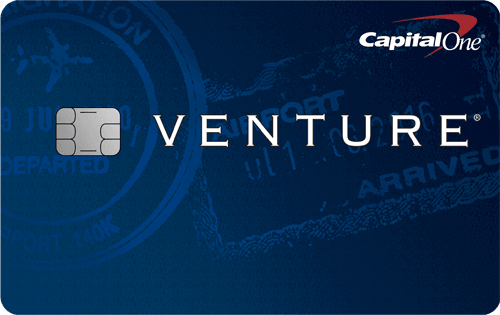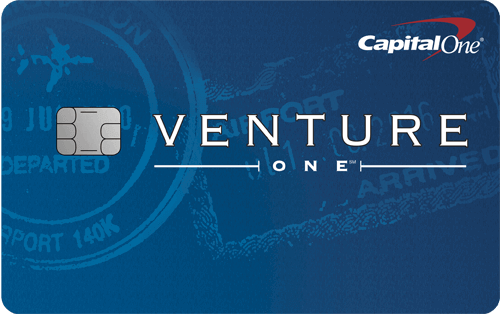Pros
- 75,000 miles initial bonus
- Unlimited 2 miles per $1 on every purchase
- Redeem for any-travel related expense
- $0 foreign transaction fee
Cons
- Terrible cash back redemption rate
- Not built for financing
Capital One Venture Rewards Credit Card
- Earn unlimited 2X miles on every purchase, every day
- Earn 5X miles on hotels and rental cars booked through Capital One Travel, where you'll get Capital One's best prices on thousands of trip options
Enjoy a one-time bonus of 75,000 miles once you spend $4,000 on purchases within 3 months from account opening, equal to $750 in travel
Rewards Details
- Enjoy a one-time bonus of 75,000 miles once you spend $4,000 on purchases within 3 months from account opening, equal to $750 in travel
- Earn unlimited 2X miles on every purchase, every day
- Earn 5X miles on hotels and rental cars booked through Capital One Travel, where you'll get Capital One's best prices on thousands of trip options
- Miles won't expire for the life of the account and there's no limit to how many you can earn
- Receive up to a $100 credit for Global Entry or TSA PreCheck®
- Use your miles to get reimbursed for any travel purchase—or redeem by booking a trip through Capital One Travel
- Enrich every hotel stay from the Lifestyle Collection with a suite of cardholder benefits, like a $50 experience credit, room upgrades, and more
- Transfer your miles to your choice of 15+ travel loyalty programs
Is Capital One Venture Worth It?
The Capital One Venture Rewards Credit Card is worth it if you have good credit or better and you travel regularly but don’t want to be limited to one airline or hotel. The Capital One Venture Card can save the average person more than $2,000 over the first two years of use, according to our calculations.
The key is to redeem Venture miles to pay for travel-related transactions once they post to your account. This gives you the best redemption rate and eliminates much of the red tape common with travel credit cards, allowing you to focus on finding the best deal no matter which airline, hotel or travel comparison site offers it.
This card makes it easy to earn lots of miles, too. It gives 2 - 5 miles per $1 spent, with an initial bonus of 75,000 miles for spending $4,000 in the first 3 months. In addition, there are some good perks like a credit for Global Entry or TSA PreCheck.
What You Need to Do to Make Capital One Venture Worthwhile
To make Capital One Venture worthwhile, you should spend at least $4,000 within the first 3 months to earn the card’s initial bonus of 75,000 miles. This will cover the card’s $95 annual fee for multiple years, allowing future rewards to go right into your pocket.
Capital One Venture miles are worth 1 cent each when redeemed for travel, so without the initial bonus, you’d have to spend between $1,900 and $4,750 in a year to break even, according to our calculations. You should also pay your credit card bill in full every month so that you don’t end up paying more in interest than you earn in rewards. The card’s APR is 19.99% - 29.99% (V).
If you’re interested in more options, I also recommend checking out the Capital One VentureOne Rewards Credit Card (see Rates & Fees) - no annual fee version - and Capital One Venture X Rewards Credit Card - version for big-spenders.
Capital One Venture Card Review Highlights
Initial Bonus of 75,000 Miles
Initial bonuses are in vogue right now, with most of the market’s best rewards cards offering some serious value. Venture is no aberration. Spending at least $4,000 during the first 3 months will earn you 75,000 miles, redeemable for $750 in travel-related expenses.
Such a bonus could go a long way toward making a long-awaited vacation affordable. For example, I could book a round-trip flight from New York to Paris with that bonus right now and still have some miles to spare. And when I did get my Capital One Venture Card bonus, I was able to completely pay for my travel between Washington, D.C., and Mexico for a friend’s bachelor party.
This offer isn’t always available, so if you’ve been thinking about applying for the Venture Card, you may want to do so sooner rather than later – provided that you wouldn’t need to spend any more than normal to qualify.
2X Miles That Are Worth It
Many credit cards offer more than one mile, point or percent cash back. Most, however, restrict their heightened earning rates to certain types of categories or simply move the redemption goalpost. But each Venture Mile is worth one cent, as long as you use your miles to pay for an eligible travel expense.
That means strategic users earn the miles-equivalent of 2% cash back on every dollar spent. They might even earn a bit more on some purchases. Hotels and rental cars booked through Capital One Travel provide 5 miles per $1 spent, or the equivalent of 5% back.
I love that Capital One Venture provides a lot of rewards value and does so in a way that is easy to understand and keep track of.
Choose Your Own Travel
Capital One makes a big deal out of the fact that users don’t have to deal with blackout dates, seat restrictions, etc. It’s certainly true but also somewhat misleading. Logistical snafus simply aren’t part of the equation because you never have to actually book anything through Capital One. Rather, you can use your card to pay for whatever travel costs you incur – whether plane tickets booked through a travel-booking site or a taxi ride – and then pay for the resulting charges with miles.
I really like this feature because you don’t have to feel like you’re missing out. You can still comparison-shop for the best travel deal without losing out on elite rewards.
You can also use miles to directly purchase flights, rental cars and hotel reservations through Capital One’s Rewards Center, but the ability to take the credit card company out of the booking process without sacrificing rewards earning potential is the more powerful component of Venture Rewards. This provides a great deal of freedom, after all, enabling you to focus on price minimization without sacrificing a redemption opportunity – even if you book through a travel-comparison website. Keep in mind, however, that airlines, hotels and other travel providers may have some blackout dates and restrictions of their own.
Relatively Broad Definition Of Travel Rewards
Whether or not you can redeem miles at the highest possible valuation depends on how the transaction you’re trying to pay for is classified on your account. If a given transaction is deemed to be “travel-related,” then your miles will be worth roughly one cent each when put to use. If not, they could be worth as little as half a cent each.
Capital One has a fairly extensive list of items that are “generally considered travel purchases” (see below), accommodating redemption across modes of transportation and hospitality expense segments. But the fact that merchant category codes ultimately rule the day means you should double-check whether fringe expenses qualify before paying for them with miles.
- Airfare
- Hotel reservations
- Cruise reservations
- Train tickets
- Travel agent fees
- Time shares
- Taxi fare
- Bus lines
- Limousine services
Venture Swallowed (Some) Of The Key Fees
None of Capital One’s credit cards charge foreign transaction fees. That alone will save Venture Card users 2% to 4% on any purchase processed outside the U.S. The freedom to use your credit card as your primary international spending vehicle also enables you to forgo hard currency exchange, saving you more than 7%, on average.
This card is not fee-free, however. For example, the Capital One Venture Rewards Credit Card has a $95 annual fee. It’s still a good deal, though.
Capital One Venture Card Review Lowlights
Annual Fees For Loyal Customers
If your interest in the Venture Card extends beyond a quick rewards score, you can expect to pay for the privilege to earn far more than the average travel credit card. The $95 annual membership fee isn’t unreasonable by any means, but it's certainly worth taking into account. I know I’ve fallen victim to paying for credit cards I no longer use.
Miles Worth Less When Redeemed For Cash Or Merchandise
Venture is a travel rewards credit card, and users sacrifice a lot of their earnings when they stray from that purpose. The number of miles you have in your account won’t change, but how much you get for them will.
The card’s initial bonus would not be worth as much when redeemed for cash back, for example. As long as you enter into this relationship with your eyes open, this shouldn’t be too big of a deal, but it’s a significant potential pitfall nonetheless.
“I made the mistake of redeeming for a normal statement credit one time, rather than a travel credit, and I was really disappointed. It was like an average card’s rewards,” WalletHub user Reid Cooper told me. “I won’t be making that mistake again.”
Other Things To Consider About the Capital One Venture Card
Not A Good Option For Financing
If you don’t pay your balance in full every month, there are better cards out there. Only the absolute best applicants will be approved for an APR toward the low end of Venture’s 19.99% - 29.99% (V) APR range, and even that is above the market average among credit cards for excellent credit: 18.01%. You won’t get any kind of 0% introductory deal, either.
I recommend only using this card for purchases that you’ll be able to pay off by the due date each month.
Capital One Venture Card vs. the Competition
You can never get a complete picture of a given credit card without comparing it to other leading offers available to qualified applicants. With that in mind, we compared Venture to the most popular travel rewards cards catered to people with above-average credit.
Capital One Venture Rewards Credit Card Review Methodology
This Capital One Venture Rewards Credit Card review is based on WalletHub’s proprietary 100-point credit card rating system. By using a consistent methodology to evaluate the Capital One Venture Rewards Credit Card and all other cards, WalletHub’s credit card experts make it easy for people to compare their options and find the best credit cards for their needs.
The WalletHub rating system uses 16 key metrics grouped into seven categories: Fees, Rewards, Two-year Cost, Interest Rates, Approval Requirements, Special Features, and Reviews. Each metric has a maximum number of points allocated to it, based on the metric’s importance as determined by our editors. The points are added up to create an overall rating for the Capital One Venture Rewards Credit Card out of a maximum of 100 points, which is then converted to a 5-point scale.
Ratings for each category reflect how close Capital One Venture is to WalletHub’s definition of a 5-star credit card, which is based on market conditions and what we believe are reasonable terms. We compare Capital One Venture to that standard to give a numerical approximation of how reasonable and competitive its terms are compared to other cards.
To learn more about how WalletHub rates credit card offers, check out our full credit card review methodology.
Ask the Experts
To help people learn more about the Capital One® Venture® Rewards Credit Card, WalletHub's editors posed the following questions to a panel of experts. You can meet our panelists and read their responses below.
- Which would you say has been more responsible for the Capital One Venture Rewards Credit Card’s longtime popularity: successful advertising or competitive rewards?
- In your opinion, what type of person should get a card like the Capital One Venture Rewards Credit Card?
- Who benefits more from credit cards made of metal: cardholders or card issuers?
Ask the Experts
Professor and Chair, Department of Geoscience, University of North Alabama
Read More
Teaching Assistant, Howard Feiertag Department of Hospitality & Tourism Management, Pamplin College of Business, Virginia Tech
Read More
Chair of Undergraduate Programs, School of Business, Assistant Professor of Hospitality & Tourism Management, Merchandising & Retail Management, Madonna University
Read More











WalletHub experts are widely quoted. Contact our media team to schedule an interview.